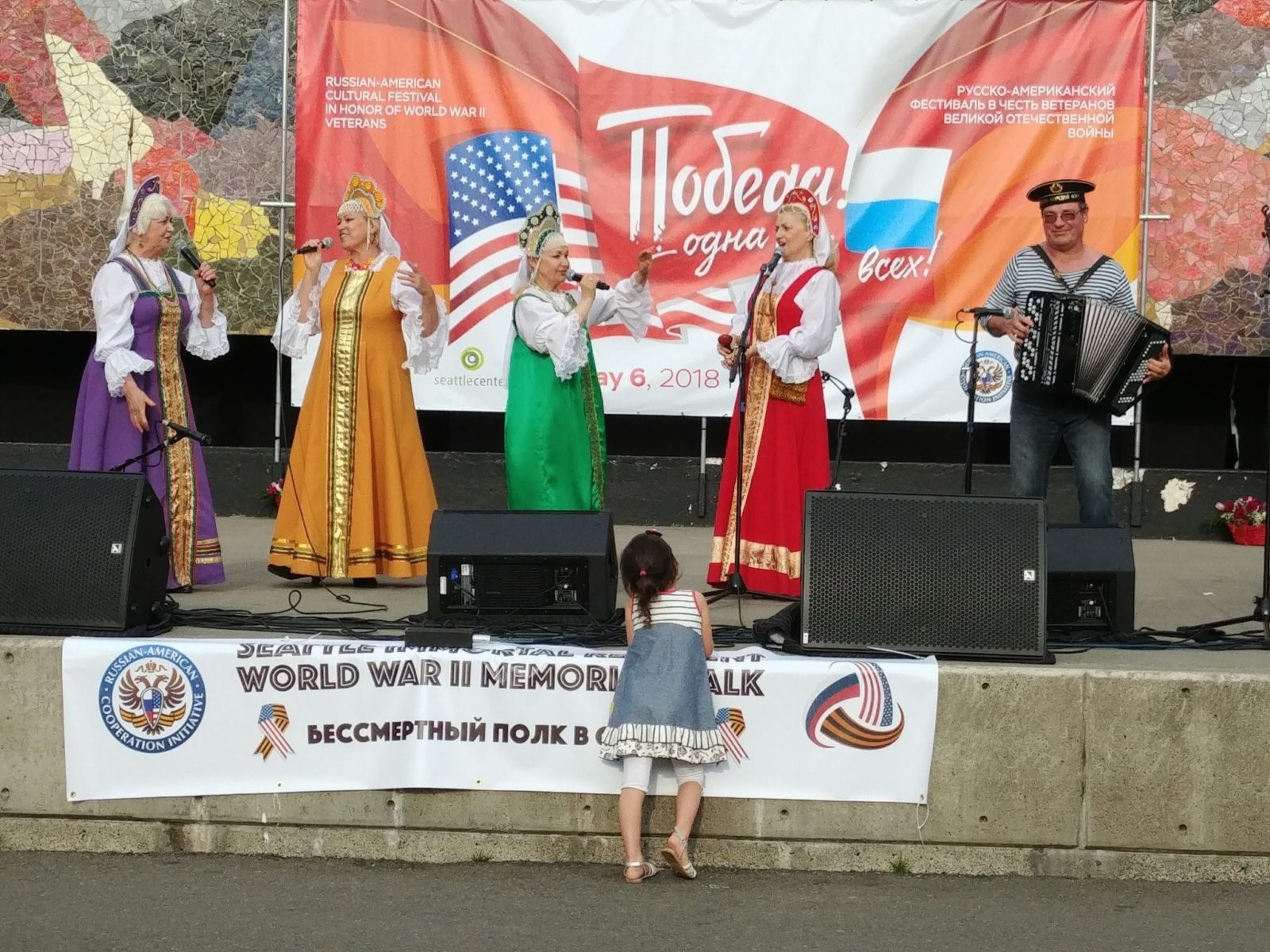“One Victory for All” Celebrated by Many Generations and Cultures

For some 10 years, I’ve shared a celebratory meal with a small group of Russian-speaking World War II veterans and their families on Victory Day, celebrating the anniversary of the surrender of Nazi Germany to Allied forces. For decades before that, I observed—from the sidelines—Soviet and later Russian military parades commemorating that surrender.
Arriving in Pioneer Square on the morning of May 6, 2018, I didn’t know what to expect. I was about to take to Seattle streets as part of a memorial walk alongside my former and current compatriots.

Photo courtesy of Denis Tikhomirov.
Clutching a portrait of my grandpa Vlad, a bona fide war hero, I also held a bright red USSR flag, a dubious symbol of common identity, selfless sacrifice, and political repression. With the Stars and Stripes displayed prominently on my t-shirt, I felt at once proud, uneasy, patriotic, and irreverent. Somehow, at that very moment, the duality of my cultural identity came to a head: “What am I doing here?” The question in my mind was just as situational as it was existential.
That’s when I heard one of the veterans speak from a small stage. In his early 90s, Evgeniy Viknyanskiy recounted the horrors of war and thanked everyone for being there. He expressed hope that, because we continue to remember what happened when his world was at war, history won’t ever repeat itself. This message seemed to resonate very strongly with everyone in the audience, whether they spoke Russian, English, or some combination of the two.

Redmond resident Evgeniy Viknyanskiy served in the Russian Navy during World War II. Photo courtesy of Yuliya Paradnaya.
Not too long after his truly inspirational speech, Evgeniy and several other war heroes climbed into the classic Soviet military vehicles, ready to lead a procession through downtown Seattle. I’ve known Evgeniy for as long as I have lived in Seattle, so before they got going, I walked over to wish him a happy Victory Day. Even though my own grandfather, Vladimir Vaisbain, is no longer here to celebrate this momentous day, I’ve felt his presence every year I visited with these amazing individuals.
But Evgeniy wasn’t here just so others could celebrate him and his fellow medal-bearing warriors. As president of the Greater Seattle Association for Veterans from the Former USSR, Evgeniy and his vice-president—Tsilya Murshteyn, who experienced World War II as a young child—took an active part in planning this year’s festivities. For decades, with support from community organizations and concerned individuals, the association has arranged the annual victory banquet, including transportation to and from the event. This is the third year of the memorial walk, but the first time that an intergenerational festival at the Space Needle with English interpretation replaced the customary invitation-only dinner.
What about the American war heroes? They were not forgotten. Everyone who took part in the march carried a red carnation to the Garden of Remembrance, a World War II memorial adjacent to Benaroya Hall (2nd Avenue at University Street).

Lenny Orlov, wearing a red hat, places a carnation in memory of his grandfather, who served in the Soviet military throughout World War II. Photo courtesy of Bettina Hansen, The Seattle Times (used with permission).
Following a raucous half hour of song and cheerful marching, I felt a sudden onslaught of emotion as I lay the flower on a solemn granite slab. It was as if I could see Grandpa’s face in the names of over 8,000 Washington state residents who paid the ultimate price for the same world peace that he, Evgeniy, and countless others bestowed upon future generations. When a Seattle Times reporter came up to ask me what I was feeling, I couldn’t muster much beyond “my grandfather is why we are here today.” Read the Seattle Times coverage and view additional photos here.
After the beautiful ritual that felt almost cathartic, most of the marchers walked over to the Space Needle for an afternoon filled with songs, dancing, and foods that are traditional to the many cultures that once coexisted under the same red flag.
Performers from Seattle, Portland, and even Alaska (pictured at top) entertained the audience. And what an audience it was! In addition to English, Russian and Ukrainian, I could hear Spanish, Hindi, and several other languages in a multiracial crowd that ranged from newborn to 100 years in age. The festival’s tagline “One Victory for All” was on full display and—unlike the previous hour—every aspect of my identity seemed to belong.
Contributor Leonid “Lenny” Orlov is an Age Friendly Seattle coordinator and can be reached at lenny.orlov@seattle.gov or 206-386-1521. Orlov grew up in the former USSR but has lived in the U.S. since the early 1990s. The photo at the top is his own.
This article originally appeared in the June issue of AgeWise King County (click here).
![Aging & Disability Services for Seattle & King County [logo]](https://www.agingkingcounty.org/wp-content/themes/sads/images/seattle-ads-logo.png)